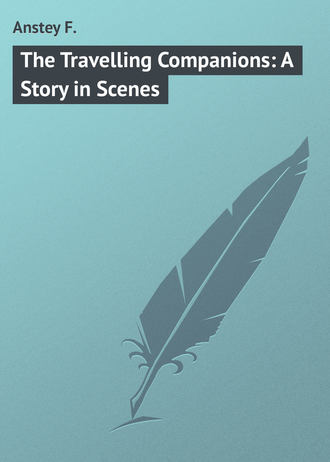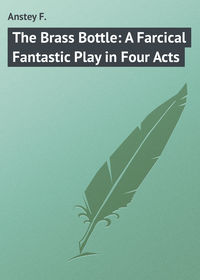 полная версия
полная версияThe Travelling Companions: A Story in Scenes
Culch. (to himself, as he follows). Can she be really as indifferent as she seems? I'm afraid she has very little heart! But if only she can be induced to go back to Lugano… She will be at the same hotel – a great point! I wish that fellow Van Boodeler wasn't coming too, though… Not that they've settled to come at all yet!.. Still, I fancy she likes the idea… She'll come – if I don't appear too anxious about it!
[He walks on, trying to whistle carelessly.
CHAPTER XIV.
Miss Banquo
Scene —Gardens belonging to the Hôtel du Parc, Lugano. Time, afternoon; the orchestra is turning up in a kiosk. Culchard is seated on a bench in the shade, keeping an anxious eye upon the opposite door.
Culch. (to himself). She said she had a headache, and made her father and Van Boodeler go out on the lake without her. But she certainly gave me to understand that she might come out when the band played, if she felt better. The question is, whether she means to feel better or not. She is the most tantalizing girl! I don't know what to make of her. Not a single reference, as yet, to that last talk we had at Bingen. I must see if I can't recall it to her memory – if she comes. I'll wait here, on the chance of it – we are not likely to be dis – . Confound it all – Podbury! (with suppressed irritation as Podbury comes up). Well, do you want anything in particular?
Podb. (cheerfully, as he sits down). Only the pleasure of your society, old chap. How nicely you do put things!
Culch. The – er – fact is, I can't promise to be a particularly lively companion just now.
Podb. Not by way of a change? Ah, well, it's a pity – but I must put up with you as you are, I suppose. You see – (with a grin) – I've got that vow to work out.
Culch. Possibly – but I haven't. As I've already told you – I retire.
Podb. Wobbled back to Miss Trotter again, eh? Matter of taste, of course, but, for my part, I think your first impression of her was nearer the truth – she's not what I call a highly cultivated sort of girl, y' know.
Culch. You are naturally exacting on that point, but have the goodness to leave my first impressions alone, and – er – frankly, Podbury, I see no necessity (now, at all events) to take that ridiculous – hum – penance too literally. We are travelling together, and I imagine that is enough for Miss Prendergast.
Podb. It's enough for me– especially when you make yourself so doosid amiable as this. You needn't alarm yourself – you won't have any more of my company than I can help; only I must say, for two fellows who came out to do a tour together, it's – [Walks away, grumbling.
Later. The band has finished playing; Miss Trotter is on the bench with Culchard.
Miss T. And you mean to tell me you've never met anybody since you even cared to converse with?
Culch. (diplomatically). Does that strike you as so very incredible?
Miss T. Well, it strikes me as just a little too thin. I judged you'd go away, and forget I ever existed.
Culch. (with tender reproach). How little you know me! I may not be an – er – demonstrative man, my – er – feelings are not easily roused, but, once roused, well – (wounded) – I think I may claim to possess an ordinary degree of constancy!
Miss T. Well, I'm sure I ought to feel it a vurry high compliment to have you going round grieving all this time on my account.
Culch. Grieving! Ah, if I could only tell you what I went through! (Decides, on reflection, that the less he says about this the better.) But all that is past. And now may I not expect a more definite answer to the question I asked at Bingen? Your reply then was – well, a little ambiguous.
Miss T. I guess it's got to be just about as ambiguous now – there don't seem anything I can say. There's times when I feel as if it might be sort of elevating and improving to have you shining around; and there's other times when I suspect that, if it went on for any considerable period, likely I'd weaken. I'm not just sure. And I cann't ever make myself believe but what you're disapproving of me, inside of you, most all the time!
Culch. Pray dismiss such – er – morbid misgivings, dear Miss Trotter. Show that you do so by accepting me as your guide and companion through life!
Miss T. My! but that sounds like a proposal?
Culch. I intended it to bear that – er – construction. It is a proposal – made after the fullest reflection.
Miss T. I'm ever so obliged. But we don't fix things quite that way in my country. We want to feel pretty sure, first, we shann't get left. And it don't seem to me as if I'd had opportunities enough of studying your leading characteristics. I'll have to study them some more before I know whereabouts I am; and I want you to understand that I'm not going to commit myself to anything at present. That mayn't be sentiment, but I guess it's common-sense, anyway. And all you've got to do is, just to keep around, and kind of impress me with a conviction that you're the vurry brightest and best man in the entire universe, and I don't believe you'll find much difficulty about that. And now I guess we'll go into table d'hôte– I'm just as ravenous!
Culch. (to himself, as he follows her). Really, this is not much better than Ruskin, after all. But I don't despair. That last remark was distinctly encouraging!
Scene —A large Salle à Manger, decorated in the Pompeian style. Table d'hôte has begun. Culchard is seated between Miss Trotter and a large and conversational stranger. Opposite are three empty chairs.
Culchard's Neighbour. Then you're going on to Venice? Well, you take my advice. When you get there, you ask for tunny. Don't forget —tunny!
Culch. (who wants to talk to Miss T.). Tunny? Thank you. I – er – will certainly remember his name, if I require a guide.
His N. A guide? No, no – tunny's a fish, Sir, a coarse red fish, with flesh like a raw beefsteak.
Culch. Is that so? Then I will make a point of asking for it – if I want raw beefsteak. [Attempts to turn to Miss T.
His N. That's what I did when I was at Venice. I sent for the Manager. He came. I said to him, "Look here, I'm an Englishman. My name's Bellerby. (Culchard bows in patient boredom.) I've heard of your Venetian tunny. I wish to taste it. Bring me some!"
Culch. (crushingly). A most excellent method of obtaining it, no doubt. (To Waiter.) Numéro vingt-sept, demi bouteille de Chianti, et siphon!
His N. You don't wait till I've done, Sir! I didn't obtain it – not at first. The man made excuses. I was prepared for that. I told him plainly, "I know what you're thinking – it's a cheap fish, and you fancy I'm ordering it out of economy!"
Culch. (raising his eyebrows for Miss T.'s benefit). Of course, he naturally would think so. And that is how you got your tunny? I see.
[Mr. Bellerby stares at him suspiciously, and decides to suppress the remainder of his tunny.
Miss T. This hotel seems to be thinning some. We've three ghosts right in front of us this evening.
Culch. (turning with effusion). So we have! My friend is one, and he'll be here presently, but I much prefer myself to see every seat occupied. There is something so depressing about a vacant chair, don't you think?
Miss T. It's calculated to put one in mind of Macbeth's little dinner-party, certainly. But you can cheer up, Mr. Culchard, here comes a couple of belated Banquos. My gracious, I do like that girl's face – she has such a perfectly lovely expression, and looks real superior too!
Culch. (who has just dropped his glasses into his soup). I – ah – which lady are you referring to? (He cleans and adjusts his glasses – to discover that he is face to face with Miss Hypatia Prendergast.) Oh … I – I see – precisely, quite so! (He turns to Bellerby to cover his confusion and avoid meeting Miss Prendergast's eye.) I beg your pardon, you were describing how you caught a tunny? Pray continue.
Mr. Bellerby (stiffly). Excuse me, I don't seem fortunate enough to have secured your undivided attention.
Culch. (with intense interest). Quite the contrary, I assure you! You were saying you always ordered it out of economy?
Mr. B. Pardon me– I was saying nothing of the sort. I was saying that I told the Manager I knew that was why he thought I ordered it – a rather different thing! "You're quite wrong," I said. "You may pay twopence-halfpenny a pound for it, and charge me half-a-crown, if you like, but I mean to taste that tunny!" I was determined not to be done out of my tunny, Sir!
Culch. (breathlessly). And what did the tunny – I mean the Manager – say to that?
Mr. B. Oh, made more difficulties – it wasn't to be got, and so on. At last I said to him (very quietly, but he saw I was in earnest), "Now I tell you what it is– I'm going to have that tunny, and, if you refuse to give it me, – well, I shall just send my courier out for it, that's all!" So, with that, they brought me some – and anything more delicious I never tasted in all my life!
Culch. (to himself). If I can only keep him on at this tunny! (Aloud.) And – er – what does it taste like exactly, now?
Mr. B. (pregnantly.) You order it, Sir —insist on having it. Then you'll know what it tastes like! [He devotes himself to his soup.
Culch. (with his eyes lowered – to himself.) I must look up in another minute– and then! [He shivers.
CHAPTER XV.
Culchard comes out Nobly
Scene —The Table d'Hôte at Lugano; Culchard has not yet caught Miss Prendergast's eye.
Culchard (to Mr. Bellerby). Have you – ah – been up Monte Generoso yet?
Mr. B. No. (After reflecting.) No, I haven't. But I was greatly struck by its remarkably bold outline from below. Indeed, I dashed off a rough sketch of it on the back of one of my visiting cards. I ought to have it somewhere about me now. (Searching himself.) Ah, I thought so! (Handing a vague little scrawl to Culchard, who examines it with the deepest interest.) I knock off quite a number of these while I'm abroad like this. Send 'em in letters to relatives at home – gives them a notion of the place. They are – ar – kind enough to value them. (Culchard makes a complimentary mumble.) Yes, I'm a very rapid sketcher. Put me with regular artists, and give us half an hour, and I – ar – venture to say I should be on terms with them. Make it three hours, and – well, I dare say I shouldn't be in it.
Podbury (who has dropped into the chair next to Miss Prendergast and her brother). Bob, old chap, I'll come in the middle, if you don't mind. I say, this is ripping – no idea of coming across you so soon as this. (Lowering his voice, to Miss P.) Still pegging away at my "penance," you see!
Miss Prend. The pleasure is more than mutual; but do I understand that Mr. – ? So tiresome, I left my glasses up in my room!
[She peers up and down the line of faces on her own side of the table.
Miss T. (to Culch.). I want you should notice that girl. I think she looks just as nice as she can be, don't you?
Culch. (carefully looking in every other direction). I – er – mumble – mumble – don't exactly —
[Here a Waiter offers him a dish containing layers of soles disguised under brown sauce; Culchard mangles it with an ineffectual spoon. The Waiter, with pitying contempt, "Tut-tut-tut! Pesce, Signore – feesh!" Culch. eventually lands a sole in a very damaged condition.
Podb. (to Miss P.). No – not this side – just opposite. (Here Culch., in fingering a siphon which is remarkably stiff on the trigger, contrives to send a spray across the table and sprinkle Miss Prendergast, her brother, and Podbury, with impartial liberality). Now don't you see him? As playful as ever, isn't he! Don't try to make out it was an accident, old fellow. Miss Prendergast knows you! [Misery of Culchard.
Miss P. (graciously). Pray don't apologize, Mr. Culchard; not the least harm done! You must forgive me for not recognizing you before, but you know of old how provokingly short-sighted I am, and I've forgotten my glasses.
Culch. (indistinctly). I – er – not at all … most distressed, I assure you … really no notion —
Miss T. (in an undertone). Say, you know her, then? And you never let on!
Culch. Didn't I? Oh, surely! yes, I've – er —met that lady. (With grateful deference to Mr. Bellerby, who has just addressed him.) You are an Art-Collector? Indeed? And – er – have you – er – ?
Mr. B. I've the three finest Bodgers in the kingdom, Sir, and there's a Gubbins – a Joe Gubbins, mind you, not John– that's hanging now in the morning-room of my place in the country that I wouldn't take a thousand pounds for! I go about using my eyes, and pick 'em up cheap. Cheapest picture I ever bought was a Prout – thirty-two by twenty; got it for two pound ten! Unfinished, of course, but it only wanted the colour being brought up to the edge. I did that. Took me half a day, and now– well, any dealer would give me hundreds for it! But I shall leave it to the nation, out of respect for Prout's memory.
Bob Pr. (to Podbury). Yes, came over by the St. Gothard. Who is that girl who was talking to Culchard just now? Do you know her? I say, I wish you'd introduce me some time.
Miss T. (to Culchard). You don't seem vurry bright this evening. I'd like you to converse with your friend opposite, so I could get a chance to chip in. I'm ever so interested in that girl!
Culch. Presently – presently, if I have an opportunity. (Hastily to Mr. B.) I gather that you paint yourself, Sir?
Mr. B. Well, yes. I assure you I often go to a Gallery, see a picture there that takes my fancy, go back to my office, and paint it in half an hour from memory – so like the original that, if it were framed, and hung up alongside, it would puzzle the man who painted it to know t'other from which! I have indeed! I paint original pictures, too. Most important thing I ever did was – let me see now – three feet by two and three-quarters. I was most successful in getting an effect of rose-coloured snow against the sky. I sponged it up, and – well, it came right somehow. Luck, that was, not skill, you know. I sent that picture to the Royal Academy, and they did me the honour to – ar – reject it.
Culch. (vaguely). An – er – honour, indeed. – (In despair, as Mr. B. rises.) – You – You're not going!
Mr. B. (consolingly). Only into the garden, for coffee. I observe you are interested in Art. We will – ar – resume this conversation later.
[Rises; Miss Prendergast rises too, and goes towards the garden.
Culch. (as he follows, hastily). I must get this business over – if I can. But I wish I knew exactly how much to tell her. It's really very awkward – between the two of them. I'm afraid I've been a little too precipitate.
IN THE GARDEN; A FEW MINUTES LATER.
Miss Prend. (who has retired to fetch her glasses – with gracious playfulness). Well, Mr. Culchard, and how has my knight performed his lady's behests?
Culch. May I ask which knight you refer to?
Miss P. (slightly changing countenance). Which! Then – you know there is another? Surely there is nothing in that circumstance to – to offend – or hurt you?
Culch. Offended? (Considers whether this would be a good line to take.) Hardly that. Hurt? Well, I confess to being pained – very much pained, to discover that I was unconsciously pitted – against Podbury!
Miss P. But why? I have expressed no preference as yet. You can scarcely have become so attached to him that you dread the result of a successful rivalry!
Culch. (to himself). It's a loop-hole – I'll try it. (Aloud.) You have divined my feeling exactly. In – er – obeying your commands, I have learned to know Podbury better – to see in him a sterling nature, more worthy, in some respects, than my own. And I know how deeply he has centred all his hopes upon you, Miss Prendergast. Knowing, seeing that as I – er —do, I feel that – whatever it costs me – I cannot run the risk of wrecking the – er – life's happiness of so good a fellow. So you must really allow me to renounce vows accepted under – er – an imperfect comprehension of the – er – facts! [Wipes his brow.
Miss P. This is quite too Quixotic. Reflect, Mr. Culchard. Is such a sacrifice demanded of you? I assure you I am perfectly neutral at present. I might prefer Mr. Podbury. I really don't know. And – and I don't like losing one of my suitors like this!
Culch. Don't tempt me! I – I mustn't listen, I cannot. No, I renounce. Be kind to Podbury – try to recognize the good in him … he is so devoted to you – make him happy, if you can!
Miss P. (affected). I – I really can't tell you how touched I am, Mr. Culchard. I can guess what this renunciation must have cost you. It – it gives me a better opinion of human nature … it does, indeed!
Culch. (loftily, as she rises to go in). Ah, Miss Prendergast, don't lose your faith in human nature! Trust me, it is – er – full of surprises! (Alone.) Now am I an abominable humbug, or what? I swear I felt every word I said, at the time. Curious psychological state to be in. But I'm out of what might have been a very unpleasant mess, at all events!
Miss T. (coming upon him from round a corner). Well, I'm sure, Mr. Culchard!
Culch. You are a young lady of naturally strong convictions, I am aware. But what are you so sure of at the present moment?
Miss T. Well, I guess I'm not just as sure of you as I should like to be, anyway. Seems to me, considering you've been so vurry inconsolable away from me, you'd a good deal to say to that young lady in the patent folders. And I'd like an explanation – you're right down splendid at explaining most things.
Culch. (with virtuous indignation). So you actually suspect me of having carried on a flirtation!
Miss T. I guess girls don't use their pocket-handkerchiefs that way over the weather. Who is she, anyway?
Culch. (calmly). If you insist on knowing, she is the lady to whom Mr. Podbury has every prospect of being engaged. I hope your mind is at ease now?
Miss T. Well, I expect my mind would have stood the strain as it was – so it's Mr. Podbury who's her admirer? See here, you're going to introduce me to that girl right away. It's real romantic, and I'm perfectly dying to make her acquaintance!
Culch. Hum – well. She is – er —peculiar, don't you know, and I rather doubt whether you will have much in common.
Miss T. Well, if you don't introduce me, I shall introduce myself, that's all.
Culch. By all means. (To himself.) Not if I can prevent it, though!
CHAPTER XVI.
Culchard feels slightly Uncomfortable
Scene —Terrace and Grounds of the Grand Hôtel Villa d'Este, on Lake Como. Podbury and Culchard are walking up and down together.
Podb. Well, old chap, your resigning like that has made all the difference to me, I can tell you!
Culch. If I have succeeded in advancing your cause with Miss Prendergast, I am all the better pleased, of course.
Podb. You have, and no mistake. She's regularly taken me in hand, don't you know – she says I've no intelligent appreciation of Italian Art; and gad, I believe she's right there! But I'm pulling up – bound to teach you a lot, seeing all the old altar-pieces I do! And she gives me the right tips, don't you see; she's no end of a clever girl, so well-read and all that! But I say – about Miss Trotter? Don't want to be inquisitive, you know, but you don't seem to be much about with her.
Culch. I – er – the feelings I entertain towards Miss Trotter have suffered no change – quite the reverse, only – and I wish to impress this upon you, Podbury – it is undesirable, for – er – many reasons, to make my attentions – er – too conspicuous. I – I trust you have not alluded to the matter to – well, to Miss Prendergast, for example?
Podb. Not I, old fellow – got other things to talk about. But I don't quite see why —
Culch. You are not required to see. I don't wish it, that is all. I – er – think that should be sufficient.
Podb. Oh, all right, I'll keep dark. But she's bound to know sooner or later, now she and Miss Trotter have struck up such a friendship. And Hypatia will be awfully pleased about it – why shouldn't she, you know? … I'm going to see if there's any one on the tennis-court, and get a game if I can. Ta-ta!
Culch. (alone). Podbury knows very little about women. If Hyp – Miss Prendergast – once found out why I renounced my suitorship, I should have very little peace, I know that – I've taken particular care not to betray my attachment to Maud. I'm afraid she's beginning to notice it, but I must be careful. I don't like this sudden intimacy between them – it makes things so very awkward. They've been sitting under that tree over there for the last half-hour, and goodness only knows what confidences they may have exchanged! I really must go up and put a stop to it, presently.
UNDER THE TREEHypatia. I only tell you all this, dearest, because I do think you have rather too low an opinion of men as a class, and I wanted to show you that I have met at least one man who was capable of a real and disinterested devotion.
Maud. Well, I allowed that was about your idea.
Hyp. And don't you recognize that it was very fine of him to give up everything for his friend's sake?
Maud. I guess it depends how much "everything" amounted to.
Hyp. (annoyed). I thought, darling, I had made it perfectly plain what a sacrifice it meant to him. I know how much he – I needn't tell you there are certain symptoms one cannot be deceived in.
Maud. No, I guess you needn't tell me that, love. And it was perfectly lovely of him to give you up, when he was under vow for you and all, sooner than stand in his friend's light – only I don't just see how that was going to help his friend any.
Hyp. Don't you really? Not when the friend was under vow for me too?
Maud. Well, Hypatia Prendergast! And how many admirers do you have around under vow, as a regular thing?
Hyp. There were only those two. Ruskin permits as many as seven at one time.
Maud. That's a vurry liberal allowance, too. I don't see how there'd be sufficient suitors to go round. But maybe each gentleman can be under vow for seven distinct girls, to make things sort of square now?
Hyp. Certainly not. The whole beauty of the idea lies in the unselfish and exclusive devotion of every knight to the same sovereign lady. In this case I happen to know that the – a – individual had never met his ideal until —
Maud. Until he met you? At Nuremberg, wasn't it? My! And what was his name? Do tell!
Hyp. You must not press me, dear Maud, for I cannot tell that – even to you.
Maud. I don't believe but what I could guess. But say, you didn't care any for him, or you'd never have let him go like that? I wouldn't. I should have suspected there was something behind!
Hyp. My feelings towards him were purely potential. I did him the simple justice to believe that his self-abnegation was sincere. But, with your practical, cynical little mind, darling, you are hardly capable of – excuse me for saying so – of appreciating the real value and meaning of such magnanimity!









